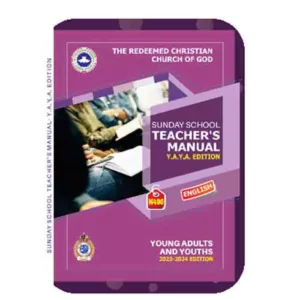This is RCCG YAYA SUNDAY SCHOOL TEACHER MANUAL 14 JANUARY 2024 LESSON 20. Today’s topic is THE BLAME GAME.
Read:
- RCCG YAYA SUNDAY SCHOOL STUDENT MANUAL 14 JANUARY 2024
- OPEN HEAVEN 14 JANUARY 2024 DEVOTIONAL
- RCCG SUNDAY SCHOOL ADULT MANUAL 14 JANUARY 2024
- RCCG HOUSE FELLOWSHIP MANUAL 14 JANUARY 2024

RCCG YAYA SUNDAY SCHOOL TEACHER MANUAL 14 JANUARY 2024 (LESSON 20)
TOPIC: THE BLAME GAME
Note: Check RCCG SUNDAY SCHOOL HYMN LYRICS
OPENING PRAYER:
Lord Jesus, help me to take responsibility for my actions.
TODAY’S LESSON
BIBLE PASSAGE: Genesis 3:9-13
9 Then the Lord God called to Adam and said to him, “Where are you?”
10 So he said, “I heard Your voice in the garden, and I was afraid because I was naked; and I hid myself.”
11 And He said, “Who told you that you were naked? Have you eaten from the tree of which I commanded you that you should not eat?”
12 Then the man said, “The woman whom You gave to be with me, she gave me of the tree, and I ate.”
13 And the Lord God said to the woman, “What is this you have done?”
The woman said, “The serpent deceived me, and I ate.”
MEMORY VERSE: Genesis 3:13
13 And the Lord God said to the woman, “What is this you have done?” The woman said, “The serpent deceived me, and I ate.”
INTRODUCTION
The blame game signifies accusations exchanged among people who refuse to accept responsibility for some undesirable events or outcomes.
These people shift fault and liability to another person or thing while they paint themselves as flawless.
We need to examine some negative effects of the blame game and learn to take responsibility for our actions instead of passing the buck.
TEACHER’S DIARY
LESSON AIM:
To enlighten the students on the negative effect of engaging in the blame game.
TEACHING OBJECTIVES:
At the end of this lesson, students should be able to:
a. Know what the blame game means.
b. State some of the negative effects of the blame game.
c. Mention ways to take responsibility for their actions.
TEXT REVIEW: Genesis 3:9-13
A. After Adam and Eve ate the forbidding fruit contrary to God’s command, the following conversation ensued between Adam and God:
i. God asked ………………………………. V9.
ii. Adam replied: ………………………… V10.
iii. God asked:
a ……………………….. V11a.
b …………………………. V11b.
B. Then the blame game began:
i. Adam: …………………… V12.
ii. God asked Eve: ……………. V13a.
iii. Eve replied: ………………… V13b.
TEACHING METHOD:
The Lecture Method.
OUTLINES
1. NEGATIVE EFFECTS OF THE BLAME GAME
2. TAKING RESPONSIBILITY
1. NEGATIVE EFFECTS OF THE BLAME GAME
The following, amongst others, are some negative effects of the blame game:
i. Chasing shadows: It makes us leave the main issue and continually look for excuses. For example, a slothful person will rather transfer blame to his boss, colleagues, government, etc. instead of dealing with laziness (Proverbs 20:4)
ii. Stagnation: It keeps us in one spot for a long time. This is counter-productive to human progress. Some people fold their arms to do nothing about their predicament because they blame and believe others are responsible for their conclusion (Proverbs 22.13. Ecclesiastes 11:4).
iii. ‘Never wrong’ syndrome: We get quick at clearing ourselves of any wrong while we see every other person as being at fault (1 John 1:8; Genesis 3:12).
iv. Depression: It births unhappiness and despair which can degenerate into depression, ill health, hopelessness, etc.
v. Mental blindness: Like a veil. It prevents one from seeing clearly as the supposed wrong of others are only seen (Mathew 7:3).
vi. Hatred: It produces deep-rooted hatred as the blame gamer condemns or speaks derogatorily about the person being blamed. Hatred is a terrible sin (1 John 3:15).
vii. Pride and Ignorance combined: Pride sets in when we over-rate ourselves. It combines with ignorance because we refuse to be sincere with ourselves (Philippians 2.3)
viii. Ingratitude: Blame gamers are unappreciative as they believe their benefactor can do more (1 Thessalonians 5:18)
ix. Bitterness: Blame gamers become offended and allow bitterness to take an evil root in them (Ephesians 4:31; Hebrews 12:15).
x. Destruction of relationships: It tears relationships through suspicion and a lack of trust (1 Samuel 18:8-9).
CLASS ACTIVITY 1:
The class should share their experience of the blame game.
2. TAKING RESPONSIBILITY
1. Taking responsibility for one’s actions or inactions may not be easy but it is worth it in the long run. Hence, we must learn to sincerely acknowledge our wrongs when we are at fault (Psalm 51:4a, 1 Kings 21.29).
2. We must show a high level of personal accountability for our actions/ inactions even in the face of failure (2 Samuel 12:13).
3. Let us ask God to create the right spirit in us so we are swift to acknowledge that there is a problem when a mistake is made or conflict arises (Psalm 51:10; 2 Samuel 24:17).
4. Identify your role in a blunder and plan on how to avoid a future occurrence (James 1:13-14).
CLASS ACTIVITY 2:
Students should share their experiences on what happened when they sincerely own up to a fault.
CONCLUSION: RCCG YAYA SUNDAY SCHOOL TEACHER MANUAL 14 JANUARY 2024
Stop trading blames, take responsibility for your actions/inactions, and be accountable.
EVALUATION:
Mention three negative effects of the blame game
CLOSING PRAYER:
Father, I receive the grace not to walk in error in Jesus’ name
ASSIGNMENT: RCCG YAYA SUNDAY SCHOOL TEACHER MANUAL 14 JANUARY 2024
Mention five people in the Bible who traded blame and support it with scriptural reference (2×5=10 marks).




